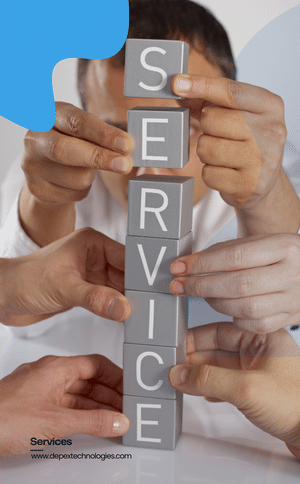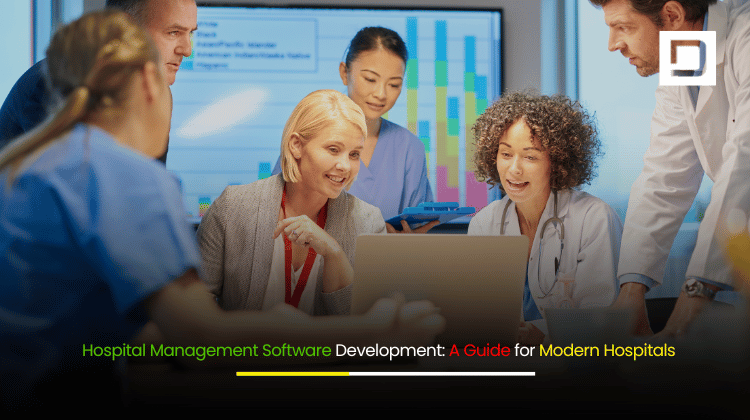Hospital Management Software Development: A Guide for Modern Hospitals
In today’s fast-paced healthcare environment, hospitals must stay ahead to offer the best care to their patients. One of the best ways to streamline hospital operations, improve patient care, and enhance overall efficiency is by implementing a robust Hospital Management Software (HMS). This guide explores everything you need to know about HMS development, the features that make it essential for modern hospitals, and how Depex Technologies can help you create a custom solution tailored to your specific needs.
What is Hospital Management Software?
Hospital Management Software (HMS) is an integrated solution that allows hospitals to manage their day-to-day operations effectively. It aids in the smooth running of administrative, financial, clinical, and support services within a hospital. From patient registration to medical records, billing, and reporting, HMS software ensures that healthcare providers can offer accurate and efficient services to patients while reducing human error and improving the quality of care.
Why is Hospital Management Software Important?
Modern hospitals face numerous challenges in delivering high-quality healthcare services. With increasing patient numbers, complex workflows, and a growing need for data management, the need for an efficient hospital management system has never been more critical. Here are some of the key reasons why hospitals should adopt a comprehensive HMS solution:
- Streamlined Operations: HMS integrates various hospital functions, reducing manual tasks and simplifying processes. From patient admission to discharge, every aspect of a hospital’s workflow becomes smoother and more coordinated.
- Improved Patient Care: With real-time access to patient data and medical histories, healthcare providers can offer personalized care. An efficient HMS enables faster decision-making, reducing wait times, and improving overall patient satisfaction.
- Data Security: Ensuring the security of sensitive patient data is crucial. A reliable HMS ensures secure storage and easy retrieval of medical records, prescriptions, and patient history, all while adhering to regulatory standards such as HIPAA.
- Cost Efficiency: By automating routine tasks, hospitals can cut down operational costs. HMS reduces administrative errors and minimizes the need for physical paperwork, which in turn reduces costs related to data entry, printing, and storage.
- Enhanced Reporting and Analytics: Hospitals can generate accurate reports on patient statistics, billing details, and other critical information. Advanced analytics tools integrated into HMS provide insights for better decision-making and strategic planning.
Key Features of Hospital Management Software
When developing an HMS, it’s essential to integrate a variety of features to ensure the software serves all hospital departments effectively. Here are the key features that should be included:
1. Patient Management System
A comprehensive patient management system is the heart of any HMS. It includes:
- Patient registration and profiling
- Appointment scheduling and management
- Patient billing and payment tracking
- Treatment history and progress tracking
2. Electronic Medical Records (EMR)
EMR integration enables healthcare providers to have a comprehensive view of a patient’s medical history. It includes:
- Medical history and test results
- Diagnoses, treatment plans, and prescriptions
- Treatment updates and lab results
3. Staff Management
Managing hospital staff efficiently is crucial for smooth operations. Features should include:
- Employee attendance and shift management
- Payroll and salary calculations
- HR management and performance tracking
4. Inventory Management
Hospitals need to manage medical supplies, equipment, and medications effectively. Key features include:
- Real-time inventory tracking
- Procurement and stock management
- Supplier management
5. Billing and Finance Management
HMS should integrate financial modules that allow for transparent and accurate billing. Features include:
- Insurance claim processing
- Patient billing and payment tracking
- Integration with accounting systems
6. Laboratory Management
Managing laboratory operations efficiently is essential for patient care. Key features should include:
- Test requests and results tracking
- Lab inventory management
- Integration with EMR
7. Pharmacy Management
Pharmacy management features enable hospitals to streamline medication distribution. These include:
- Prescription tracking
- Stock management
- Integration with EMR and billing systems
8. Appointment Scheduling
Online appointment scheduling allows patients to book appointments with healthcare providers at their convenience. This feature should include:
- Patient self-booking portal
- Appointment reminders via SMS or email
- Integration with the patient management system
9. Security and Compliance
Hospital management software must adhere to strict data security standards. Features include:
- Data encryption and secure storage
- Role-based access controls
- Compliance with healthcare regulations such as HIPAA
AI Integration in Hospital Management Software
AI (Artificial Intelligence) is revolutionizing the healthcare industry, offering hospitals the ability to automate complex tasks, improve patient outcomes, and streamline hospital management processes. AI-powered features in hospital management software can bring numerous advantages to both healthcare providers and patients.
Key AI Features in HMS:
- Predictive Analytics: AI can analyze large sets of healthcare data to predict patient outcomes, such as the likelihood of readmission or the risk of developing specific conditions. This enables hospitals to take preventive actions and reduce the burden on healthcare staff.
- Patient Engagement Tools: AI chatbots can assist patients in managing appointments, answering basic healthcare queries, and providing reminders for medications. This improves patient engagement and reduces administrative workload.
- Clinical Decision Support: AI can analyze patient data in real-time and provide doctors with insights and recommendations. This helps healthcare professionals make faster and more accurate decisions, leading to improved patient care.
- Automation of Administrative Tasks: AI can automate repetitive administrative tasks such as billing, appointment scheduling, and data entry. This reduces the chances of human error and ensures that hospital operations run smoothly.
- Enhanced Medical Imaging: AI can be used to analyze medical images (such as X-rays, MRIs, and CT scans) with greater accuracy. AI-powered imaging tools help radiologists detect anomalies and diagnose conditions more quickly.
- Natural Language Processing (NLP): NLP enables AI to analyze and understand unstructured text in patient records. This helps healthcare providers extract useful information from medical notes, prescriptions, and reports to improve the overall quality of care.
Benefits of AI Integration in Hospital Management:
- Improved Efficiency: By automating tasks and enhancing decision-making, AI integration streamlines hospital operations and saves valuable time for medical staff.
- Cost Savings: With AI, hospitals can optimize resource utilization, reduce errors, and automate administrative functions, all of which lead to significant cost savings.
- Enhanced Patient Outcomes: AI’s predictive capabilities help hospitals take preventive measures to avoid complications and improve patient health outcomes.
- Better Resource Management: AI can analyze hospital data to optimize staff scheduling, reduce wait times, and ensure that critical resources like ICU beds and medical equipment are available when needed.
Technology Stack for Hospital Management Software
To ensure that the HMS is scalable, reliable, and secure, it’s important to select the right technology stack. At Depex Technologies, we work with the latest technologies to deliver cutting-edge solutions:
- Front-end Development: HTML5, CSS3, JavaScript (React, Angular, Vue.js)
- Back-end Development: Node.js, Python (Django), Java (Spring Boot)
- Database Management: MySQL, PostgreSQL, MongoDB
- Cloud Platforms: AWS, Microsoft Azure, Google Cloud
- Mobile Development: Swift (iOS), Kotlin (Android)
- Security: SSL/TLS encryption, OAuth 2.0, HIPAA-compliant storage solutions
Customizing Your Hospital Management Software
Each hospital has unique needs, so a one-size-fits-all approach may not work. When developing custom hospital management software, it is crucial to tailor the solution according to the size, specialty, and complexity of the hospital. At Depex Technologies, we work closely with our clients to design solutions that integrate seamlessly with their existing systems, workflows, and technology infrastructure.

We focus on creating intuitive user interfaces for medical professionals, administrative staff, and patients, ensuring a user-friendly experience. We also provide continuous support and maintenance to keep the software up-to-date with the latest technology and regulatory changes.
Benefits of Developing Hospital Management Software with Depex Technologies
Depex Technologies offers expert software development services that include the complete design, development, and deployment of Hospital Management Software. Here’s why you should choose us for your next project:
- Tailored Solutions: We understand the unique challenges faced by hospitals and offer fully customized software development that meets your specific requirements.
- Cutting-edge Technology: We use the latest technologies to ensure your HMS is secure, scalable, and efficient.
- User-Centric Design: Our designs focus on ease of use, ensuring that the software is intuitive and accessible for all users, from healthcare professionals to administrative staff.
- End-to-End Support: From initial consultation to post-launch support, we provide continuous assistance to ensure your hospital management software operates smoothly.
- Dedicated Development Teams: For large-scale projects, we offer dedicated developers or a dedicated team that works exclusively on your software development, ensuring timely delivery and ongoing improvements.
Conclusion
The development of a robust and efficient Hospital Management Software is essential for modern hospitals to remain competitive and provide the best care to their patients. By integrating features like patient management, EMR, billing, inventory, and pharmacy management, hospitals can streamline operations, reduce errors, and improve patient satisfaction.
With the integration of AI technologies, hospitals can further optimize their operations, automate administrative tasks, and improve patient outcomes. AI-powered features like predictive analytics, clinical decision support, and automated billing make hospital management more efficient than ever before.
At Depex Technologies, we specialize in custom HMS development, ensuring that each solution is tailored to your hospital’s unique needs. Our expert developers are ready to create a solution that boosts your hospital’s efficiency and enhances patient care. For long-term projects, we offer dedicated developers or teams to help you scale and support your HMS.
Contact Depex Technologies today to discuss how we can help you develop a custom hospital management solution that will enhance your hospital’s operations and patient care.






